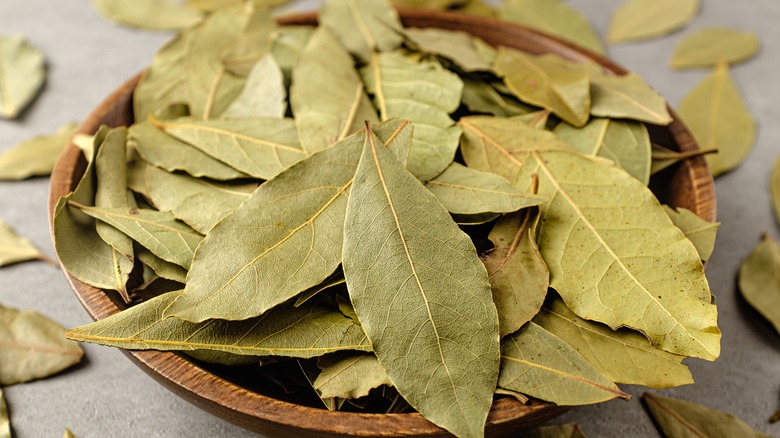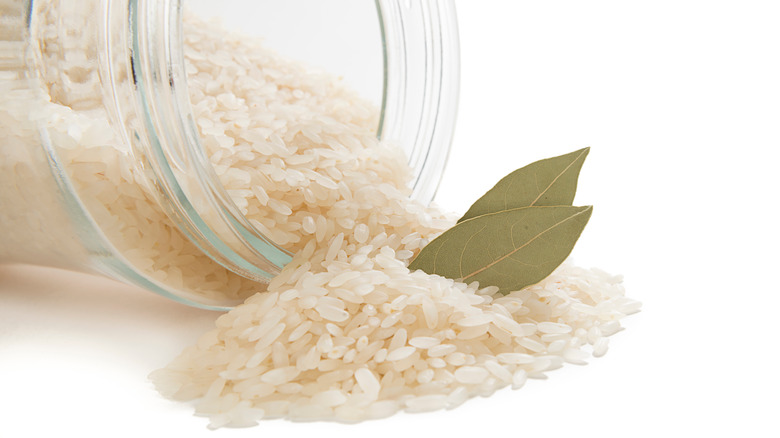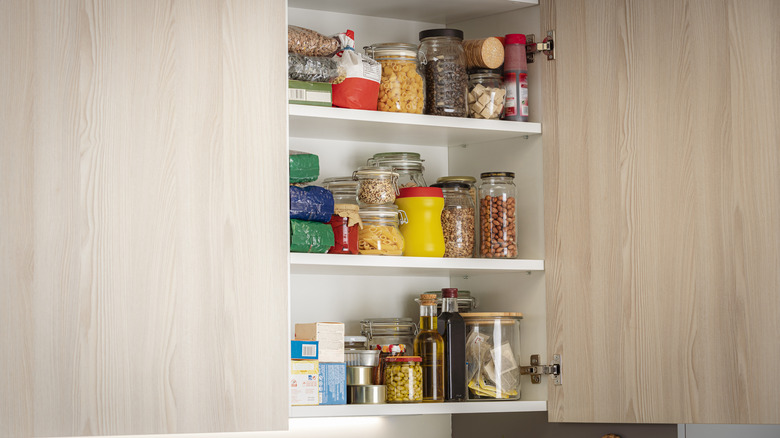Don't Just Cook With Bay Leaves - Use Them To Protect Your Pantry
Bay leaves may not be as powerful as mint or as fragrant as basil, but they lend a subtly fresh, complex flavor to stews, sauces, braises, and more. Beyond its usefulness in many recipes, you might not realize that a bay leaf's gentle aroma also has the power to protect your pantry. This plant contains essential oils that can enrich recipes like
, while repelling bugs from the ingredients you use to cook them.
This knowledge is especially handy when you find an old jar of dried bay leaves in the back of your spice cabinet. Stale leaves lose most of their spicy, woodsy aroma, but you can repurpose them to deter pests that might hitch a ride into your home from the grocery store, or make their way in from outside. The unique smell of the leaves can protect dry goods like flour, rice, cornmeal, and more.
To get the most out of your bay leaves, tuck them directly into the packages on your pantry shelves, like bulk bags of rice, containers of dried beans, etc. Their scent will help ward off cockroaches, mosquitos, and tiny bugs known as silverfish, among others. Some even say that they repel weevils and red flour beetles, which enjoy gnawing on flour, legumes, nuts, and fruit. These insects are most active during warm summer months, so try breaking out some bay leaves during a spring cleaning session.
How to best use bay leaves to repel bugs
Bay leaves contain eucalyptol, an essential oil also used in perfumes and breath fresheners to create a refreshing, cooling scent. That same aromatic component also works against unwanted seasonal visitors, like small pantry bugs and even mice. Researchers are still working to understand eucalyptol's efficacy in repelling pests, but many sources claim that household critters dislike the scent.
If you've ever had a bug problem in your pantry, try tucking a bay leaf into ingredients that won't clash with its savory aroma. The leaves' herbaceous whiff is subtle, but can seep into other foods. Ingredients for use in desserts (like sugar and cocoa powder) may be better off without a leaf, unless you're working on a sweet-savory experiment. And if you add dried bay leaves directly into bags of flour, cornmeal, beans, etc., remember to fish the leaves out before cooking with these items, or you might find a papery surprise in your dinner.
You can also scatter bay leaves at the bottom of trash cans and recycling bins, if you notice bugs gathering around the area. And if you have direct access to a bay laurel tree, you can stash whole branches in areas that attract pests, as the bright scent will pack a punch. Just know that you'll be able to smell it, too, so maybe reserve this trick for the garage, basement, or other remote areas.
Keeping your pantry clean and pest-free
Bay leaves, unfortunately, are not a foolproof tool for pest prevention. If you do spot bugs in your open bag of flour, don't panic. Start by discarding all contaminated food. Make sure to thoroughly inspect absolutely every item in the whole closet or cabinet, so you don't miss any pests. Remove and discard any shelf coverings, which could be contaminated. Then, vacuum and clean the whole area thoroughly with soap and water.
Once you're ready to restock your selves, consider storing paper-, foil-, and plastic-wrapped goods in sturdier containers made out of metal or glass. Some bugs, like moths, can chew through thinner materials, which means that while canned and jarred goods are safe, others remain vulnerable. Keeping your goods properly sealed draws less pests in and keeps any stray critters out.
In the future — in addition to using the bay leaf trick — try to use up your ingredients quickly, well before they spoil. That means checking to see if your flour expired and being cognizant of that date. In addition to warding off bugs, you'll enjoy the benefit of consuming dry goods at their peak flavor and texture. For example, once sugar shows signs of going bad, it turns lumpy and much harder to bake with, even though it won't make you sick. Moving through items in a matter of months, rather than years, will make cooking and much easier.



